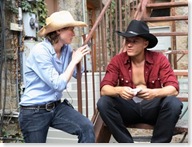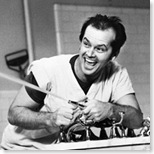The Best Fashion Show is on the Street
- Bill Cunningham New York a film by Richard Press
- On the Street with Bill Cunningham, New York Times
- Wexner Center Member-Only Screening, April 14, 2011
Posted by
Daron
at
1:27 PM
![]()
Labels: Bill Cunningham, culture, diversity, fashion, identity, individuality, New York City, originality, photography, seeing, society
Excerpt from “The Broken Society,” by David Brooks, New York Times (March 18, 2010):
Phillip Blond argues that over the past generation we have witnessed two revolutions, both of which liberated the individual and decimated local associations. First, there was a revolution from the left: a cultural revolution that displaced traditional manners and mores; a legal revolution that emphasized individual rights instead of responsibilities; a welfare revolution in which social workers displaced mutual aid societies and self-organized associations.
Then there was the market revolution from the right. In the age of deregulation, giant chains like Wal-Mart decimated local shop owners. Global financial markets took over small banks, so that the local knowledge of a town banker was replaced by a manic herd of traders thousands of miles away. Unions withered.
The two revolutions talked the language of individual freedom, but they perversely ended up creating greater centralization. They created an atomized, segmented society and then the state had to come in and attempt to repair the damage.
The free-market revolution didn’t create the pluralistic decentralized economy. It created a centralized financial monoculture, which requires a gigantic government to audit its activities. The effort to 
[Thanks Suzanne!]
Posted by
Daron
at
8:21 AM
![]()
Labels: culture, David Brooks, economic classes, freedom, government, individuality, society
Excerpt from Think Little by Wendell Berry from A Continuous Harmony: Essays Cultural & Agricultural (1972):

But the discipline of thought is not generalization; it is detail, and it is personal behavior. While the government is "studying" and funding and organizing its Big Thought, nothing is being done. But the citizen who is willing to Think Little, and, accepting the discipline of that, to go ahead on his own, is already solving the problem. A man who is trying to live as a neighbor to his neighbors will have a lively and practical understanding of the work of peace and brotherhood, and let there be no mistake about it — he is doing that work. A couple who make a good marriage, and raise healthy, morally competent children, are serving the world's future more directly and surely than any political leader, though they never utter a public word. A good farmer who is dealing with the problem of soil erosion on an acre of ground has a sounder grasp of that problem and cares more about it and is probably doing more to solve it than any bureaucrat who is talking about it in general. A man who is willing to undertake the discipline and the difficulty of mending his own ways is worth more to the conservation movement than a hundred who are insisting merely that the government and the industries mend their ways.
Posted by
Daron
at
10:41 PM
![]()
Labels: bureaucracy, discipline, excerpt, government, individuality, thinking, Wendell Berry

"I would say about individuals: an individual dies when he ceases to be surprised. What keeps me alive — spiritually, emotionally, intellectually — is my ability to be surprised. I say, I take nothing for granted. I am surprised every morning that I see the sun shine again. When I see an act of evil, I am not accommodated — I don't accommodate myself to the violence that goes on everywhere. I'm still surprised. That's why I'm against it; why I can fight against it. We must learn how to be surprised, not to adjust ourselves. I am the most maladjusted person in society."
~ Abraham Joshua Heschel, from "The Spiritual Audacity of Abraham Joshua Heschel," Speaking of Faith (6.05.08)
Posted by
Daron
at
1:51 PM
![]()
Labels: Abraham Joshua Heschel, ethics, individuality, right action, truth
Elvis Mitchell: In your movies there's a lot of vanity that the characters have. The characters pay a lot of attention to their looks, which is also really the province of young people, too, isn't it? I mean you're constantly sort of aware of the way you appear superficially. They like looking at themselves. They look really cool in those uniforms and that's a big part of it, too, these guys, so many of them have the flag tattooed on the bicep --
 Kimberly Peirce: So there's two things there. One is masculinity, which I find really interesting because you really do have to perform masculinity in order to sustain it. It doesn't kind of just come naturally, even for men in a way...I originally got a hold of twenty soldier videos and they were putting cameras on sandbags, on gun turrets, inside Humvees, and--unfiltered—just recording their experience. But that wasn't enough. Then they were going back to their barracks and they were cutting them into, in a way, what was a fantasy of themselves.
Kimberly Peirce: So there's two things there. One is masculinity, which I find really interesting because you really do have to perform masculinity in order to sustain it. It doesn't kind of just come naturally, even for men in a way...I originally got a hold of twenty soldier videos and they were putting cameras on sandbags, on gun turrets, inside Humvees, and--unfiltered—just recording their experience. But that wasn't enough. Then they were going back to their barracks and they were cutting them into, in a way, what was a fantasy of themselves.
So they would take Toby Keith, I'm an American Soldier—I mean the words in the Toby Keith song are heartbreaking and great, it's kind of like, I'm just an average guy, but I happen to be at war, and I can't go home at night, and look at the sacrifices I go through—it's total heroism...Or it's the thrill kill stuff which is, Look at me, I'm powerful [Linkin Part, AC/DC, Rage Against the Machine]...It's like, Wow, America is powerful, don't screw with us...So when you talk about that narcissism or that sense of one's own image, when I look at these videos, I see, Wow, they're really trying to tell their own story, but in a way that really makes them look both heroic and strong and patriotic.
Discussing her film Stop-Loss on KCRW's The Treatment (4.02.08)
 "We invent institutions to help make the world more just, more rational. Life in society would not be possible without orphanages, schools, courts, government offices, and mental hospitals, yet no sooner do they spring into being than they start to control us, regiment us, run our lives. They encourage dependency to perpetuate themselves and are threatened by strong personalities."
"We invent institutions to help make the world more just, more rational. Life in society would not be possible without orphanages, schools, courts, government offices, and mental hospitals, yet no sooner do they spring into being than they start to control us, regiment us, run our lives. They encourage dependency to perpetuate themselves and are threatened by strong personalities."
~ Miloš Forman, from Turnaround: a memoir
 From The War of Art by Steven Pressfield:
From The War of Art by Steven Pressfield:
The artist and the fundamentalist both confront the same issue, the mystery of their existence as individuals. Each asks the same questions: Who am I? Why am I here? What is the meaning of life?
At more primitive stages of evolution, humanity didn’t have to deal with such questions. In the states of savagery, of barbarism, in nomadic culture, medieval society, in the tribe and the clan, one’s position was fixed by the commandments of the community. It was only with the advent of modernity (starting with the ancient Greeks), with the birth of freedom and of the individual, that such matters ascended to the fore.
These are not easy questions. Who am I? Why am I here? They’re not easy because the human being isn’t wired to function as an individual. We’re wired tribally, to act as part of a group. Our psyches are programmed by millions of years of hunter-gatherer evolution. We know what the clan is; we know how to fit into the band and the tribe. What we don’t know is how to be alone. We don’t know how to be free individuals.
...The paradox seems to be, as Socrates demonstrated long ago, that the truly free individual is free only to the extent of his own self-mastery. While those who will not govern themselves are condemned to find masters to govern them.
[Listen]
 In this small collection of essays, Doris Lessing considers the challenges involved in thinking and acting independently amid and the powerful pressures to fit into groups—friends, family, work, church, clubs, neighborhoods, political parties, national governments, etcetera.
In this small collection of essays, Doris Lessing considers the challenges involved in thinking and acting independently amid and the powerful pressures to fit into groups—friends, family, work, church, clubs, neighborhoods, political parties, national governments, etcetera.
"We are group animals still, and there is nothing wrong with that. But what is dangerous is not the belonging to a group, or groups, but not understanding the social laws that govern groups and govern us."
I never get tired of reading about and discussing the concept of groupthink, or group mind, as this author calls it. I see it as one of the most important issues in our lives: negotiating the balance between personal freedom and the common good. This requires objectivity which is challenging enough for us as individuals and daunting for large, complex groups.
"I think when people look back at our time, they will be amazed at one thing more than any other. It is this—that we do know more about ourselves now than people did in the past, but that very little of this knowledge has been put into effect."
It also takes objectivity to see that our situation is not hopeless.
"This is a time when it is frightening to be alive, when it is hard to think of human beings as rational creatures. Everywhere we look we see brutality, stupidity, until it seems that there is nothing else to be seen but that—a descent into barbarism, everywhere, which we are unable to check. But I think that while it is true there is a general worsening, it is precisely because things are so frightening we become hypnotized, and do not notice—or if we notice, belittle—equally strong forces on the other side, the forces, in short of reason, sanity and civilization."

Daron Larson
Freelance Contemplative
